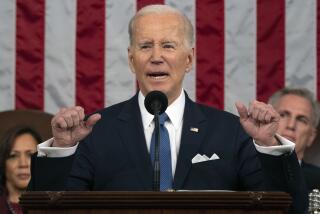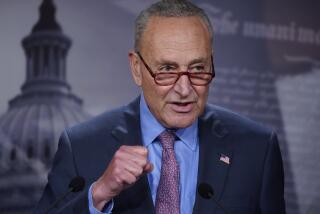Modest Boost for Economy Planned : Spending: White House advisers urge a $20-billion stimulus package as part of long-term program to cut the deficit. Clinton to reveal details in his State of Union.
- Share via
WASHINGTON — The Clinton Administration, seeking to balance its campaign pledges to create jobs and to curb the federal budget deficit, plans to propose a modest, short-term economic stimulus package as part of a larger, long-term deficit-reduction program, Administration officials said Tuesday.
The Administration’s key economic advisers are urging a one-time package of $15 billion to $20 billion that is likely to be dominated by new federal spending on such programs as public works and education. The amount is less than one-third of the $50-billion to $60-billion stimulus plan many Clinton aides originally advocated.
The White House said Tuesday that the temporary stimulus plan and the longer-term investment and deficit-reduction program will be described during President Clinton’s first State of the Union Address on Feb. 17.
Labor Secretary Robert B. Reich, fresh from a meeting Monday of Clinton’s top economic advisers, said Tuesday that the stimulus package is likely to cost $15 billion to $20 billion.
Rep. Norman Y. Mineta (D-San Jose), chairman of the House Public Works and Transportation Committee, said he had been told last week by White House economic adviser Robert E. Rubin that the Administration was considering a slightly higher figure of $24 billion for a stimulus package divided roughly into three equal segments: $8 billion for health and environment, $8 billion for transportation and infrastructure and $8 billion for education and training.
Although White House Communications Director George Stephanopoulos confirmed that the Administration is planning a stimulus package, he insisted Tuesday that its size has not yet been determined. The sudden flurry of discussion about economic stimulus follows a steady drumbeat by Clinton advisers on the need for economic sacrifice to achieve serious deficit reduction.
A series of grim layoff announcements by major corporations in recent days also has reinforced the idea among Clinton advisers that the economic recovery has not had a significant impact on employment. And economists are warning of growing signs that the economic recovery, which began to gather steam after the November election, may be faltering.
More signs of sluggishness came Tuesday: A new private report showed that consumer confidence leveled off in January after a big two-month gain, and the government said the pay and benefits of U.S. workers grew by only 3.5% in 1992, the slowest rate of annual growth in more than a decade. Although most forecasters now believe that the economy grew by about 3% in the final three months of 1992, they expect growth to slow to a rate of about 2.5% in the first quarter of 1993.
Such a slowdown could stymie the Clinton Administration’s efforts to focus on long-term deficit reduction instead of short-term recovery. In fact, Clinton aides now seem to believe that they must take some action to help anxious middle-class Americans who elected Clinton on his promise of economic change and recovery.
“We may have to stimulate the economy in the short term,” Reich said Tuesday. “The job picture still doesn’t look very good. The economy seems to be coming back. We’re going to have some economic news pretty shortly that I think is going to show some progress, but on the job front we still have a problem and we can’t have a genuine recovery, a real booming, buoyant recovery, until we get those jobs back. So we may have to have a little bit of stimulus.”
But congressional analysts and economists believe that the modest size of the proposed stimulus package indicates that it may amount to little more than “sugar-coating” for the bitter medicine of spending cuts and tax increases that Clinton also plans to propose in his State of the Union address. Economists noted that $15 billion to $20 billion in spending represents just 0.3% of the nation’s total output of goods and services--not enough to have much impact on the economy.
“Doing a stimulus package of that size probably comes under the category of keeping your campaign promises, but not much more,” noted David Rolley, an economist at DRI-McGraw Hill, an economic research firm in Lexington, Mass. “But it does show a certain level of unease in the Clinton Administration about the strength of the recovery.”
David Hale, chief economist of Kemper Financial Services in Chicago, said, however, that a small stimulus package, coupled with a long-term deficit plan, will be well received in the financial markets. The markets had been fearful that Clinton would propose a much larger recovery program that would increase the deficit, thus putting more pressure on the Federal Reserve Board to raise interest rates to finance the federal debt.
Treasury Secretary Lloyd Bentsen indicated on Sunday that, although a $20-billion stimulus package is relatively small, it would still be valuable for its psychological impact on American consumers. “Unemployment is still 7.3%; you have 9.3 million people out there looking for jobs,” Bentsen said. “And the President is committed to try to see that that’s taken care of.”
A small stimulus package also might give Clinton and his advisers more room to take drastic action on the deficit in later years. A short-term recovery package would increase the deficit in the near term, but the Clinton team believes that it would be more than offset by future spending cuts and tax increases.
Clinton has said repeatedly that he hopes to reduce the deficit by $145 billion by the end of his first term, an ambitious goal that almost certainly would require politically controversial cuts in a wide range of popular programs, such as Medicare and Social Security.
It also would mean that Clinton will have to push for broad tax increases that would hit the middle class. Clinton advisers say that, although a final decision has not yet been made, a broad-based fuel tax is being seriously considered.
Clinton’s increased emphasis on deficit reduction also has forced him to scale back his plans for new investment spending programs on education, public works and job training. While such spending will make up the bulk of the short-term stimulus program, the total will be much more modest than originally anticipated.
Meanwhile, the Congressional Budget Office projected a record $310-billion deficit for the current fiscal year ending Sept. 30. The deficit will remain in the $300-billion range throughout much of the 1990s but will begin a precipitous rise to $653 billion by 2003, it said.
CBO Director Robert Reischauer proposed bitter medicine, telling the Senate Budget Committee that elected officials and the public must end “the borrowing binge” and sacrifice now to invest in the future.
“They must be willing to pay higher taxes and receive fewer government benefits in the 1990s for the sake of higher living standards in the next century,” he said.
Times staff writer Robert W. Stewart contributed to this story.
More to Read
Get the L.A. Times Politics newsletter
Deeply reported insights into legislation, politics and policy from Sacramento, Washington and beyond. In your inbox twice per week.
You may occasionally receive promotional content from the Los Angeles Times.










